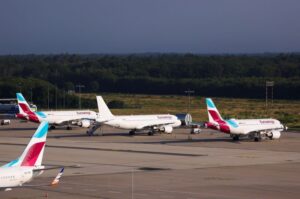Impacts of Proposed Tariffs on the Aerospace Sector: A Call for Caution
Recent discussions over new tariffs on imported commercial aircraft, jet engines, and parts have raised red flags among global aerospace companies and U.S. airlines. Industry leaders are voicing concerns that these tariffs could jeopardize air safety and disrupt supply chains, leading to a ripple effect of unforeseen complications.
Current State of Tariffs
Since April, the aerospace industry has been grappling with a 10% tariff imposed on most imported planes and components. This measure, initiated by former President Donald Trump, was part of a broader strategy aimed at protecting national interests. However, this situation has escalated; last month, the Commerce Department launched an investigation under Section 232, which examines potential threats to national security from imported goods. This investigation could pave the way for even more stringent tariffs on vital aerospace imports.
Industry Reaction
The Aerospace Industries Association (AIA)—a coalition that includes giants like Boeing, Airbus, and GE Aerospace—has taken a proactive stance. They have formally requested that the Commerce Department extend the public comment period for the Section 232 investigation by 90 days and refrain from imposing any new tariffs for at least the next 180 days. Their rationale is simple yet critical: any new tariffs should not only align with genuine national security concerns but also must not impair supply chain stability or aviation safety.
AIA specifically underscored a recent incident where a fire at a Pennsylvania supplier of aerospace fasteners has already disrupted production. With such incidents highlighting the fragility of the current supply chain, establishing new domestic suppliers could take up to a decade to meet the stringent safety certifications required in the industry.
Economic and Operational Implications
The economic stakes are high. Airlines for America, which represents major players like American Airlines, United Airlines, and Delta Air Lines, cautioned that the proposed tariffs could lead to increased ticket prices and shipping rates. They argue that injecting higher costs into the aviation sector could undermine both economic and national security, making it difficult for the domestic aviation industry to compete and innovate.
Furthermore, the potential tariffs could unravel the already fragile recovery of the aviation supply chain. This may inadvertently increase the risk of counterfeit parts entering the market—an outcome that could severely compromise safety and reliability.
A Move Towards Tariff-Free Trade?
In light of these challenges, airlines and manufacturers are advocating for the reinstatement of a tariff-free framework under the 1979 Civil Aircraft Agreement. This agreement had previously allowed the U.S. aerospace sector to enjoy a substantial $75 billion annual trade surplus, contingent upon parts being certified by the Federal Aviation Administration (FAA). Advocates argue that restoring this system would not only enhance competitiveness but also bolster safety and reliability across the sector.
Conclusion
The stakes in this ongoing tariff debate are immense, with implications stretching across the entire aerospace landscape. As readers and investors, it’s critical to stay tuned to developments in this area, as understanding the impact of such tariffs will be vital for informed decision-making in the ever-evolving world of finance and investment. The decisions made today could define the future trajectory of the aerospace industry, influencing everything from job creation to national security.
At Extreme Investor Network, we’re committed to providing you with timely and actionable insights into the factors shaping the financial landscape. Stay informed, stay engaged, and let us guide you through the complex world of aerospace finance.

